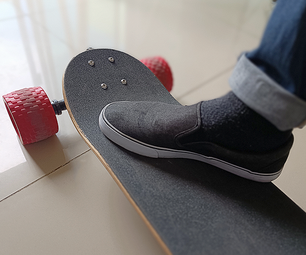Introduction: Custom M324 Airsoft Rifle
Even as a big guy, the M324 seems too long for most games. I wanted to cut the barrel and hand guard down, to make it more of a scout/recon rifle.
Step 1: Tools
For tools, I used my Dremel, a hack saw, a small Phillips screw driver, a few hex wrenches (they came with the gun when I bought it) and a Gerber multitool.
If I had to, I could have done it with a Phillips, small flathead screwdriver, the hex wrenches and the hacksaw, so don't think you need to use all this stuff.
Also, having a shop cat helps. Sometimes.
Step 2: Dropping Some Weight
I started by removing the hex screws from under the barrel and taking the stock off. I then took out the Phillips screws from the back half of the stock and removed the sling mount. This let me pull the plastic apart and get to the weights in the stock.
Step 3:
I chose to remove one of the weights, and I wanted to keep the bottom one. I think this will make it less top heavy, and more stable when being carried. Also, it will keep a little heft, which should help keep it steady when firing.
If the weights are loose and rattle or move, some electrical tape should keep them in place.
Step 4: Do Not to Be Forgettings!
When taking the stock apart, it's very important to remember what screws came from which hole. They are almost all different sizes and can damage the gun if put back wrong. Also, these metal parts can fall out and might be lost in a couch and could maybe make you look for an hour before you finally find the lost one. Just sayin'.
Step 5:
Make sure to charge your Dremel or have a hack saw, otherwise you might work for an hour and only accomplish this... mess.
Step 6:
After getting a hold of a hack saw, I made quick work of the barrel. You want to be very careful here, because of the design of the weapon.
There is a black plastic spacer that keeps the small internal barrel straight. It's about five inches from the tip of the weapon and it isn't glued to anything, so after removing the tip, you should be able to slide it out.
You don't want to put too much pressure on the internal barrel, as this might bend or kink the tube and throw off the accuracy.
Lastly, when cutting the black outer barrel, you don't want to go too far and cut the inner barrel. If you do, the orange tip won't fit right when you go to put it back together.
Step 7:
This is the orange tip, after being removed. I keep the tips on all my guns, but cover them with tape when I play. If you want, you can paint it black, but I wouldn't recommend throwing it away, as it helps stabilize the inner barrel and makes the weapon more accurate and durable.
There are grooves along the top that sit in the barrel, and this makes it harder to fit it back into the barrel. I used the Dremel to cut three grooves from the open end and stopped just before the plastic that would be visible when it's installed. This let the tip flex and fit back inside the barrel, but also let it stick enough not to be loose when I reassembled.
Step 8:
I used the Dremel's cutoff wheel for the hand guard end, trimming around 2.5 inches off. Looking inside the hand guard, you will be able to see that this removes the Picatinny rail where the bi-pod mounts. I never used the bi-pod, but saved the parts in case I want to put it on later. Be careful here, if you cut too much off you'll take some of the magazine release and it might not hold the mag in right after reassembly.
Step 9:
Here's the stock and barrel after being finished, just before reassembly. It doesn't look that much shorter, but it's lost six inches and about three pounds of weight.
Step 10:
Here it is after putting the scope back on and test firing a few times. Accuracy and power haven't changed at all, and it definitely feels more manageable when moving.












